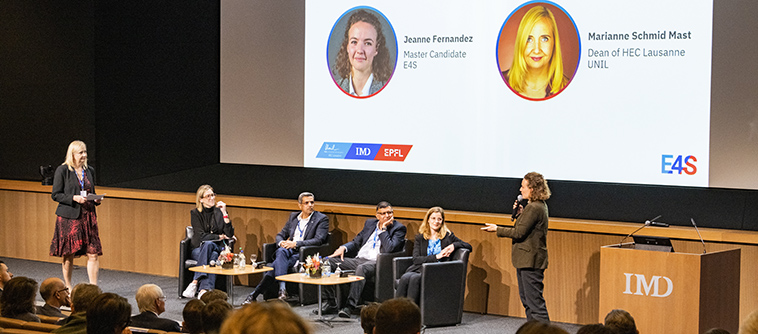The 2022 summit of the E4S Center probed how we can take better care of both the earth’s physical resources and employees’ mental health.
E4S – the Enterprise for Society Center, a collaboration between three leading academic institutions: UNIL-HEC, IMD, and EPFL – held its third annual summit in Lausanne to discuss the transition towards a more resilient and inclusive economy that allows us to live within planetary boundaries.
Founded to inspire this transition while being mindful of the opportunities and challenges raised by science and technological change, the E4S Center promotes dialogue between researchers, educators, policymakers, and practitioners.
“If we want to activate change and promote change, we cannot do it in an ivory tower on our campuses,” said Professor Jean-Pierre Danthine, one of the co-managing directors of the E4S Center in his opening address.
“We need to engage an entire ecosystem; we want to form a coalition of actors, public, private, big or small – and together we can really provoke change.”
An example of this public-private collaboration is a Decarbonization Observatory for Western Switzerland, formed by Romande Energie SA and the E4S Center, and announced at the summit.
Limiting our use of the earth’s resources
The first panel at E4S looked at how to transition away from a linear take-make-waste model of consumption towards the circular economy, where we reuse, repair, refurbish, and recycle existing materials.
Ryan Roberts, Group Head of Sustainable Construction at Holcim, said the Swiss group recycles 50 million tons of building materials per year and is looking to double that by 2030. In 2019, it launched the world’s first green cement, which is made of 20% of recycled construction and demolition waste.
Roberts said he believed society could use the world’s existing building stock as a “global mine” to build everything new from old. This will require upgrades to the supply chain to allow materials to be recovered from demolished buildings and processed into waste that is able be reused.
“If we are serious about not breaching planetary limits, it’s all about collaboration,” he said.
The panel also looked at the role of the financial sector in promoting the circular economy. Jean-Pascal Porcherot, Managing Partner, Lombard Odier, said the private bank believed the world needed to move away from an economy he described as WILD (Wasteful, Idle, Lopsided and Dirty) towards a CLIC economy (Circular, Lean, Inclusive and Clean) , and argued that consumers were already prepared to pay a green premium for corporates taking action.
He said the financially successful companies of the future will be those who play a role in contributing to the circular economy. “If we were just pricing carbon at the right level, I believe that 50% of companies would go bankrupt.”
Transitioning towards renewable energy
“The energy sector is at the core of the problem and source of the solution,” said Professor Jean-Philippe Bonardi, co-managing director of E4S as he opened the second panel, which assessed the roadblocks and innovative drivers of the energy transition.
Lord Adair Turner, Chairman of the Energy Transitions Commission, was optimistic that the falling costs of renewable energy and “a revolution in technological possibilities” would help the building, transport, and energy sectors achieve net zero by 2050. Countries such as Spain and Australia, for example, expect to get 74% and 82% of electricity generation from renewables by 2030, he said.
EPFL Professor Mario Paolone pointed out that the electricity system was essentially a more efficient and circular system than the fossil fuels on which we currently rely. Each year, the sun shines down about 8-10,000 times as much energy and solar energy as the world needs, added Lord Turner.
Speaking of the challenges and roadblocks, Christian Petit, CEO of Romande Energie SA, pointed out that this shift towards renewable energy will require extracting as many minerals from the subsoil over the next 30 years as we have taken out since the beginning of humanity.
“I fear we will shift from an addiction to fossil fuels to an addiction to metals,” he warned.
All panelists noted that the transition will also require changes in consumer demand with an increased focus on “sufficiency” and not just “efficiency”. Lord Turner argued that the quickest way for consumers to make a difference on climate change would be to limit their consumption of red meat to just once a month.
The impact of an extractive economy on our mental health
The final panel looked at how to build a more resilient workforce. IMD Professor Alyson Meister said mental health, once a taboo topic, was increasingly being put front and center by organizations as they wake up to the need to help employees manage stress and overwhelm. “For every dollar we invest in mental health, four dollars go back to the economy,” she said.
EPFL Professor Hillal Lashuel said organizations tended to “individualize the problem” by blaming the victim rather than taking responsibility for the cultural, environmental, and workplace factors that might trigger burnout and stress.
“We also have to recognize that leaders bear a lot of responsibility and need to nurture a culture where stress and overwhelm are limited,” said IMD Professor and Dean of Research Anand Narasimhan, while E4S-IMD Senior Researcher Nele Dael said a major contributor to overwhelm was having an unsupportive environment and feeling that you are not being heard by your manager.
“Leaders can have a role both ways,” said Meister. “Sometimes you are suffering yourself. You are just trying to get by, and don’t notice the effect you are having because emotions are contagious. But also, you can have such a positive effect if you can disclose, if you listen, if you can let your people know that they are heard, and that you have empathy and care for them.”
The event also included reflections from current E4S students on the topics discussed. Jeanne Fernandez, a master’s candidate, summed up the arguments. She said, “Our planet is having a burnout. We are behaving as if we have endless resources, and we are doing the same for the planet. If we are doing more energy management, more circular management maybe, we would have more resilient individuals in a more resilient society.”
Bringing the event to a close, IMD President Jean-François Manzoni said E4S was created to leverage the best of three institutions. “It’s wonderful to have a younger group, and to have people who have the ambition and drive to contribute to a better world.”



